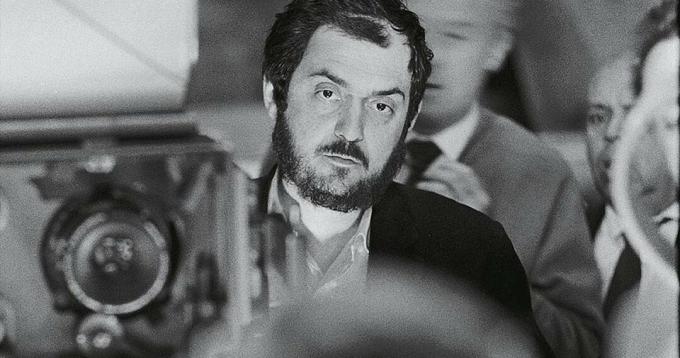The 80 best phrases of Stanley Kubrick
stanley kubrick (1928 - 1999) was an American director, screenwriter and photographer born in New York, USA.
This fantastic filmmaker is recognized as one of the best film directors of all time and a benchmark of the seventh art. His cult films, which include among others: The Shining, A Clockwork Orange or Full Metal Jacket, are without a doubt films that we should all see on occasion.
- It may interest you: "The 14 cult films that you cannot miss"
Great reflections and phrases of Stanley Kubrick
With this article we want to pay a small tribute to this fantastic director by sharing with you The 80 best phrases of Stanley Kubrick, we hope you enjoy them!
1. No critic has ever clarified any aspect of my work for me.
Kubrick has received criticism from people who didn't really understand the value of his work.
2. I think the big mistake in schools is trying to teach children using fear as motivation.
Fear can paralyze our mind so that we cannot think clearly.
3. The first really important book I read on film was Pudovkin's The Film Technique. So I had not yet touched a movie camera and it opened my eyes to cutting and editing.
The work that Kubrick did throughout his career was simply outstanding.

4. I never knew anything at school and just read a book for pleasure at 19 years old.
Primary education is often not received adequately, it also happened to Stanley Kubrick.
5. If you can speak brilliantly enough on a subject, you will give the impression that you have mastered it.
The gift of prayer can help us appear more intelligent than we really are.
6. The destruction of this planet would make no sense on a cosmic scale.
The universe is so big that the planet we live on is just a speck of dust floating in the vastness of space.
7. Making movies is an intuitive process, just as I imagine composing music is intuitive. It is not a matter of structuring a discussion.
Those who master an art are able to do it almost without thinking, as they would say in music: playing by ear.
8. I don't like giving interviews. There is always the danger of being misquoted or, worse yet, quoting exactly what you said.
When we perform live we cannot make any kind of mistake, because it will be recorded.
9. I have always enjoyed taking on a slightly surreal situation and presenting it realistically.
Kubrick is a genius of the seventh art and has made spectacular works of all genres.
10. If it can be written or thought, it can be filmed.
The limits in the cinema are only set by our imagination.
11. If man would just sit and think of his immediate end and his horrible insignificance and loneliness in the cosmos, he would surely go mad, or succumb to a numbing or soporific sense of worthlessness.
The vastness of the cosmos is overwhelming and can make us see how small we really are.
12. Maybe it's vanity, this idea that the job is bigger than one's ability to describe it.
Stanley Kubrick has been surpassed many times by the genius of the work that he has been able to present.
13. The sense of mystery is the only emotion that is felt more strongly in art than in life.
The mystery can be represented very well in the cinema, but in life it is much more difficult to perceive.
14. There are few directors you have to see everything they did. I put Fellini, Bergman and David Lean at the top of my first list and Truffaut at the top of the next level.
Kubrick told us about other directors that he also admired.
15. A movie is (or should be) like music. It must be a progression of moods and feelings. The theme comes after the emotion, the meaning, after.
The way Kubrick was able to express himself through his films was undoubtedly something very special in this great film director.
16. When a man cannot choose, he ceases to be a man.
Our power of decision allows us to be the person we are, freedom.
17. Some people can give interviews. They are very evasive and almost escape this hateful conception. Fellini is good; His interviews are very funny.
Kubrick shows us his admiration for the great director that Fellini was undoubtedly.
18. I tried to create a visual experience that would transcend the limitations of language and directly penetrate the subconscious with its emotional and philosophical charge. As McLuhan would say, in 2001 the message is the medium.
Kubrick was quite a genius in his art in that he innovated with many of his films.
19. I wanted the film to be an intensely subjective experience that reached the viewer at an internal level of consciousness like music does; to explain a Beethoven symphony would be to emasculate it by raising an artificial barrier between conception and appreciation (2001).
Kubrick explains to us in this quote the importance that he gave to the vision that viewers will have of his work.
20. It is not a message that I have tried to convert into words. 2001 is a non-verbal experience; Out of two hours and 19 minutes of film, there is only a little less than 40 minutes of dialogue.
Without a doubt, A Space Odyssey is a film that no one can miss, a benchmark in the science fiction genre.
21. The very nature of the viewing experience is to give the viewer an instant, visceral reaction that cannot and should not require further amplification.
How Kubrick developed in his work as a director is something that can be seen in his works.
22. The moment in a movie often prevents every exhilarating detail or nuance from having its full impact the first time it is seen.
The films seek to impact the viewer in such a way that he falls in love with them.
23. New York is the only really hostile city. Perhaps there is a certain element of "lumpen literati" that is so dogmatically atheistic and materialistic and terrestrial that finds the grandeur of space and the gaze of mysteries of cosmic intelligence a anathema.
Kubrick tells us about that great city loved by all that is undoubtedly New York.
24. Once you accept that there are roughly a hundred billion stars in our galaxy, that each star is a sun capable of supporting life and that there are approximately one hundred billion galaxies in the visible universe, it is plausible to believe in God.
The cosmos was always something that captivated Kubrick, not in vain is it an inexhaustible source of inspiration.
25. But movie critics, fortunately, rarely have any effect on the general public. The theaters fill up.
Criticism and Kubrick didn't get along very well, but he never cared.
26. Generally speaking, I would say that there are elements in any good film that can increase the viewer's interest and appreciation on a second viewing.
Many of Kubrick's films are made to be seen more than once.
27. I don't agree with this idea of Arthur's, and I think he made it as a joke. If someone understands it the first time he sees it, we would have failed in our intention. Why does someone have to watch the movie twice to get the message from him?
Kubrick had a very particular way of seeing cinema, which made him stand out in his own works.
28. Other ancient planets must have progressed from biological species, which are fragile shells for the mind, to immortal mechanical entities.
Kubrick tells us about the evolution that humans could follow over time.
29. Children begin life with a sense of unalloyed wonder, a capacity to experience total joy over something as simple as the green of a leaf; but as they grow older, the awareness of death and decay begins to permeate them and subtly erode their joie de vivre, their idealism.
The passing of the years changes our personality and our attitude, especially in relation to how we see or relate to what life presents us with.
30. How much we could appreciate La Gioconda today if Leonardo had written at the bottom of the painting: This woman is smiling because she has bad teeth or because she is hiding a secret from her lover. He would have removed the appreciation of the beholder and would have put him in another reality different from his own. I didn't want that to happen.
The author of a work can give us a predetermined vision of it to cause us contradictory emotions.
31. Our psychic shell creates a buffer between us and the paralyzing notion that only a few years of existence separate life from death.
Human beings face death in many different ways, but we all share an intrinsic hope within us that lasts a lifetime.
32. Maybe wanting to break records sounds like a very self-interested way to evaluate one's work, but I think that, especially with a film that is so obviously Differently, breaking viewership records means people are saying good things to others after watching it, and isn't that really what it's all about? treats?
Kubrick was always aware that his work changed people's lives, he was a genius who was very much in touch with his own artistic capacity.
33. Whether we admit it or not, in every man's chest is a small chest of fear pointing to this final knowledge that eats away at his ego and his sense of purpose.
People's emotions can be something very difficult to understand, but when we discover what it is that eats us we must go for it.
34. Now, our Sun is not an old star and its planets are almost children of cosmic age.
As Kubrick explains to us in this quote, our Solar system it is a young solar system, always speaking in stellar age.
35. Cinema has been excluded from the category of art until a few years ago, a situation that I am glad is finally changing.
Kubrick explains to us in this sentence his feelings towards his own art and why it should be more recognized.
36. We don't think we can listen to a great piece of music once, or see a great painting once, or even read a great book once.
Works done with genius should be enjoyed more than once.
37. Our ability, unlike other animals, to conceptualize our own death creates enormous psychic suffering.
Kubrick explains to us in this quote that thinking about our own death can cause us great sorrow.
38. I don't believe in any of the monotheistic religions on Earth, but I believe that each can construct a scientific definition of God.
Kubrick certainly had a very personal opinion about religion.
39. When you think of the gigantic technological advances that man has made in just a millennium, less than a microsecond in the chronology of the Universe, can you imagine the evolutionary development that older life forms may have reached?
As Kubrick exposes in this quote, theoretically an extraterrestrial civilization could have reached a brutal technological level over the millennia.
40. Precisely the lack of meaning in life forces man to create his own meaning.
Life can seem meaningless to us and we ourselves always look for a reason for things in it.
41. Experienced in a visual and emotional cinematic context, however, good films strike the deepest chord of one's existence.
Kubrick sought to contact the most personal part of all of us in his films.
42. The idea that a film should only be seen once is an extension of our traditional conception of a film as ephemeral entertainment rather than a work of visual art.
Kubrick nurtured his works so strongly that they were impossible to fully digest with a single viewing.
43. The critics all work for New York publications. 2001 viewings in America and around the world have been 95 percent enthusiastic. Some are more perceptive than others, of course, but even those who praise the film on relatively superficial features are able to get some of the message from it.
Kubrick always had a very special relationship with critics, a constant tug of war throughout his career.
44. He would say that the concept of God is at the heart of 2001 but not just any traditional, anthropomorphic image of God.
His great work A Space Odyssey set a precedent for what Kubrick was capable of achieving with his genius.
45. Given that there is a planet in a stable orbit, not too hot and not too cold, and given a few hundred million years of chemical reactions created by the interaction of solar energy with the chemistry of the planet, it is fairly certain that life, in one form or another, will eventually will emerge.
It is a matter of mere probability that life has arisen and will arise throughout the length and breadth of space.
46. It is reasonable to assume that there must, in fact, be hundreds of millions of planets where biological life has been born and the possibility of that life developing intelligence is high.
Kubrick was a clear advocate that life could exist beyond our own planet.
47. Certain ideas found in 2001 can, if presented as abstractions, often fall lifeless and are automatically assigned to the appropriate intellectual category.
Kubrick thought a lot about how his works would be viewed by the general public and critics.
48. You are free to speculate as you like about the philosophical and allegorical meaning of the film, and that speculation is an indication that it has succeeded in taking the audience to a deeper level.
This great director always wanted to delve into the depths of the audience's consciousness of him.
49. I believe that if a film succeeds, it is by reaching a broad spectrum of people who had not had a thought about the destiny of man, his role in the cosmos and his relation to higher forms of life.
A quote in which Kubrick talks about the virtues of one of his most relevant films throughout his career.
50. I don't want to trace a verbal path for 2001, that each spectator feels obliged to follow or even to improvise the theme of having lost the thread.
This famous cult film could be difficult to follow for the neophyte Kubrick viewer. In addition, it is one of the most remembered Stanley Kubrick phrases.
51. Lucasfilm, has conducted investigations in many areas (movie theaters and theater) and published the results in a report that confirms virtually all the worst suspicions of him. For example, in one day, 50% of the impressions were ruined. The amps are not good and the sound is bad. The lights are uneven...etc.
Kubrick found out about the movie theaters that showed his films, because if these were not good, the film could not be seen in its fullest by the viewer.
52. I have always liked fairy tales and myths, magical stories.
Kubrick was always a big fan of the fantastic genre, as well as literature on myths and legends.
53. Fellini just makes jokes and says absurd things that he knows can't be taken seriously during his interviews.
Kubrick talks about one of his idols and how he laughed at criticism as well as at him.
54. They think it's some kind of insane anxiety to worry about the theaters where my film is shown.
In this quote Kubrick talks about how people thought he was a real obsessed with his work.
55. The great nations have always acted like gangsters, and the small ones, like prostitutes.
Society can be a very bizarre place, and Kubrick knew exactly what he was talking about.
56. Because, you might ask: why should I bother to write a great symphony or fight for a living, or even to love another, when I am no more than a momentary microbe in a speck of dust circling through the unimaginable immensity of the space?
When we become aware of how small we really are on a cosmic scale, we can appreciate the enormity of the universe.
57. Anyone who has had the privilege of directing a film knows what I'm talking about: although it may be like trying to write War and Peace. riding a bumper car at an amusement park, when you finally get it, there's no pleasure in this life that can match that sensation.
Kubrick was in love with his work and with it he reached his personal nirvana.
58. There is something in the human personality that resents clear things, and conversely, something that attracts puzzles, enigmas and allegories.
Human beings always tend to become obsessed or at least to show great interest in the problems we encounter.
59. A director with a camera is as free as an author with a pen.
The tool by which a film director expresses himself is the camera, both photographic and video.
60. I don't always know what I want, but I know what I don't want.
Kubrick knew very well what exactly he did not want to represent with his film projects.
61. The screen is a magical medium. He has such power that he can hold interest as he conveys emotions and moods that no other art form can convey.
Cinema is undoubtedly one of the media that can provoke more feelings in the viewer.
62. If the work is good, all that is said about the general is irrelevant.
Kubrick was never influenced by criticism, he was very clear about his position.
63. You sit in front of a board and suddenly your heart skips a beat. Your hand shakes as you pick up a piece and move it. But what chess teaches you is that you have to stay there calmly and think if it really is a good idea or if there are other better ideas.
Kubrick was an avid chess player, and the hobby of him sure helped him develop his cognitive abilities.
64. Never, ever come close to power. And don't be friends with anyone powerful, it's dangerous.
The corrupt always crave power, which is why most of the powerful are corrupt.
65. To make a movie all by myself, something that I at first may not have needed to know much about other things, what I did need to know was photography.
Photography was the passion for which Kubrick ended up entering the cinema.
66. To make a movie you only need a camera, a recorder and some imagination.
With these three simple tools anyone can record their own home movie.
67. Art consists in reshaping life but not in creating life, nor in causing life.
Kubrick had this particular vision of what art was for him, without a doubt a very personal way of understanding it.
68. A man writes a novel, a man writes a symphony, it is essential for a man to make a film.
This great filmmaker had the primary need to express himself through his art.
69. It may sound ridiculous, but the best thing young filmmakers can do is grab a camera and create a movie of any kind.
Kubrick knew very well that the most you learn in the world of cinema is by creating cinema.
70. Observation is a dying art.
Kubrick knew very well as a filmmaker and photographer that the result of a work depends a lot from the angle from which it is looked at.
71. Interest can produce in learning, on a scale compared to fear like a nuclear explosion to a firecracker.
Kubrick always had a very particular point of view on the education of the little ones.
72. As vast as the darkness is, we must bring our own light.
All of us are unique and special, but it only depends on us how bright we are able to shine.
73. All work and no play makes Jack a dull boy.
The game in children favors that they develop properly in the world that surrounds them.
74. The dead only know one thing, it is better to be alive.
How Kubrick viewed death and his relationship with it was undoubtedly something very special in this fabulous filmmaker.
75. I have never been sure if the moral of the Icarus story should only be, as is generally accepted, "don't try to fly too high”, or it could also be thought of as “forget the wax and feathers, and do a better job at the wings".
Undoubtedly Stanley Kubrick had great optimism regarding life, we must learn a lot from him.
76. If chess has anything to do with movie making, it would be in the way it helps you develop intelligence. patience and the discipline to choose between alternatives at a time when an impulsive decision seems very attractive.
As a chess player, Kubrick learned some techniques such as the control of emotions and how to manage them.
77. You are an idealist, and I pity you as I would the village idiot.
Stanley Kubrick was always a person with a great intellect and a unique personality, qualities that were undoubtedly used when making his films.
78. Do you think (Schindler's List) was about the Holocaust... That was about success, wasn't it? The Holocaust is about six million people being killed. "Schindler's List" is about 600 that don't. Anything else?
Kubrick knew how to see the positive aspect in all his films that few people were capable of perceiving.
79. The reason the movies are often so bad here is not because the people who make them are cynical pirates of money. Most of them are doing the best they can; They really want to make good movies. The problem is in their heads, not in their hearts.
In the seventh art, greed leads many actors and directors to do a mediocre job just to earn money.
80. Include complete banalities.
Kubrick speaks to us in this quote about his film Full Metal Jacket, which, despite being a cult film, touched on many aspects of daily life.



